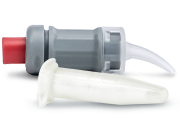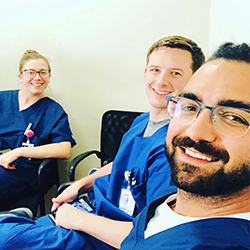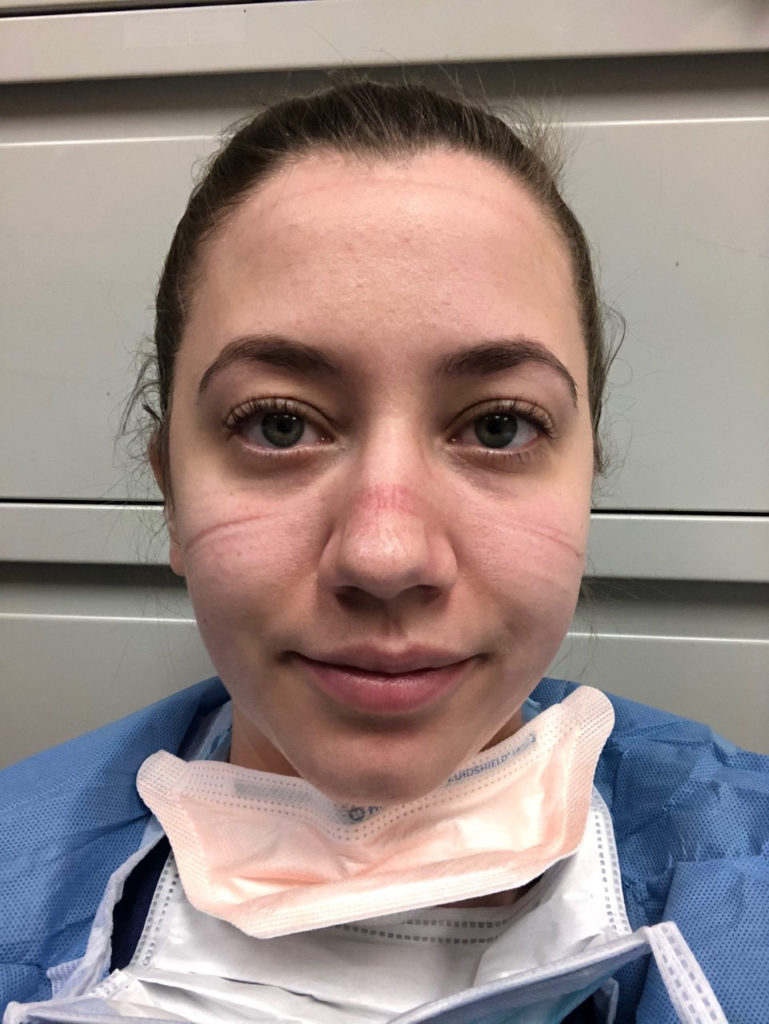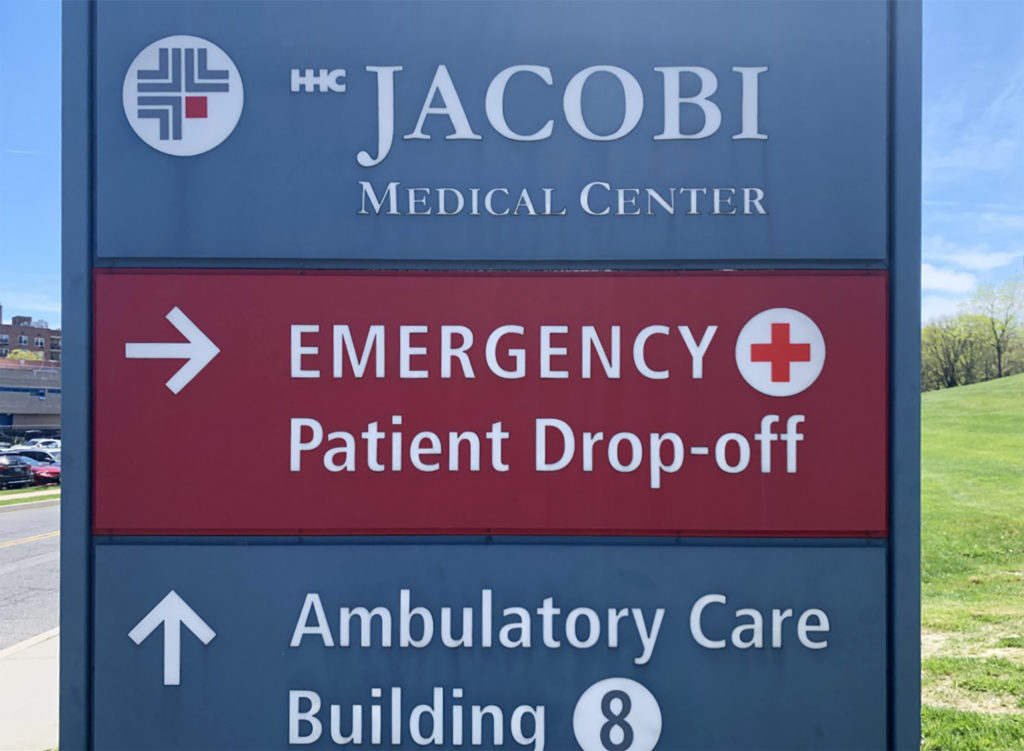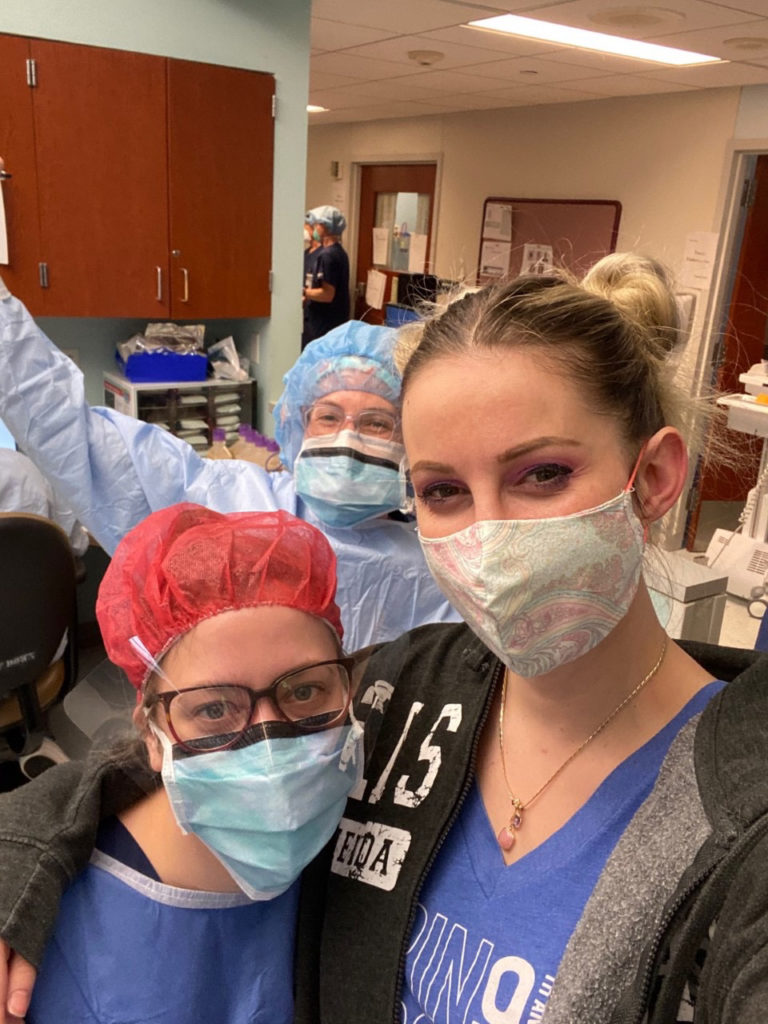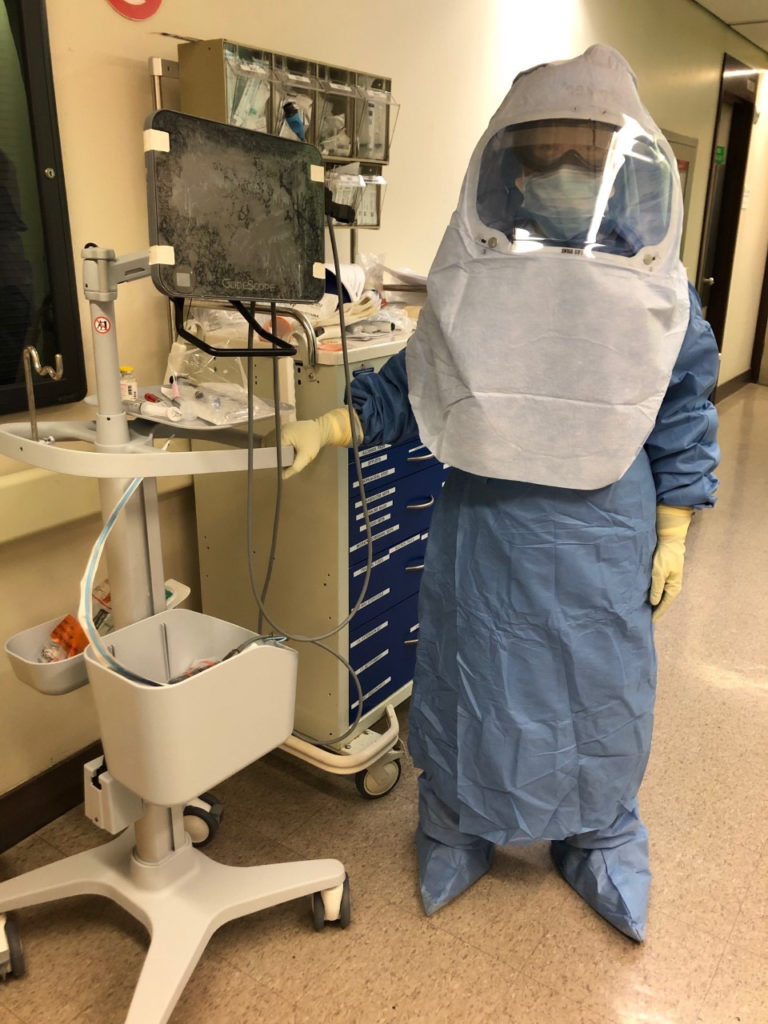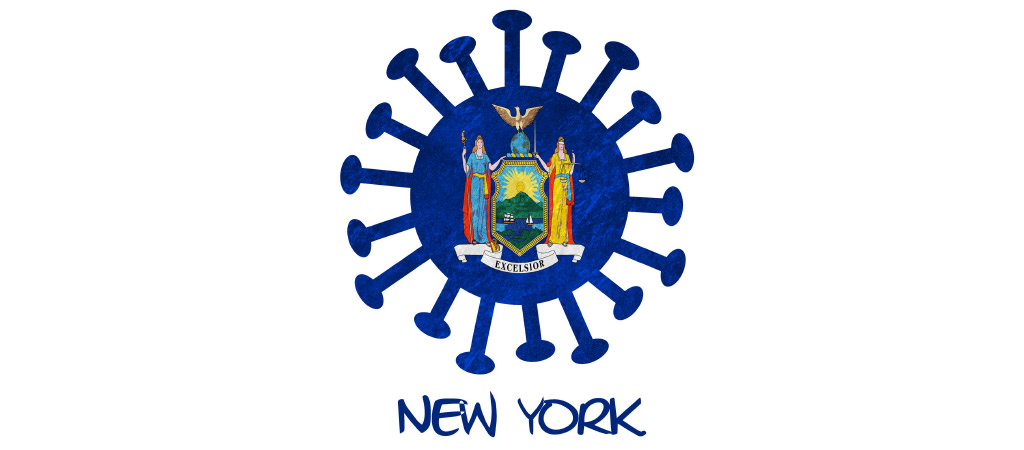
I awake to the sound of sirens going off. I open my eyes and realize it’s just the alarm on my phone screaming at me to wake up. After hitting the snooze button many times, I slowly get out of bed at 5:30 a.m. After showering and getting ready, I dress in paper scrubs so I won’t have to wear my own clothes on the subway. I carefully put on one of the few surgical masks available to me. This one was given to me by one of the hospital anesthesia staff after being shocked when I told him I wasn’t wearing a mask on the subway because I didn’t own one.
After making the hour-long commute from the Upper East Side to the hospital where I work in the Bronx, I rush inside and put my stuff away. Typically, as a dental anesthesiology resident, I would be going to the OR where I put people to sleep and wake them up every day. Instead, I head to the medical floor, recently transformed into a makeshift ICU, which the anesthesia and dental departments now oversee. I gear up in one of my two N95 masks that I won’t take off all day, except during my 20-minute lunch break.
After receiving instruction in the basics of how to function as an ICU resident, I get handoff from my co-resident who has been here working for 24 hours straight. She warns me, “Three patients coded last night and they likely won’t make it much longer.” We round past each patient’s room; all but two are intubated.
A patient begins to display abnormal rhythms. My co-resident tells me, “Don’t worry. His family came yesterday to say goodbye and signed a DNR after seeing him.” I worry anyway. We watch from outside his room as he goes into asystole. Time of death is 7:52 a.m. This is the first time I’ve seen a deceased person. After he passes, someone comments, “Now his ventilator can be used for one of our other patients.”
After cleaning the recently deceased patient’s ventilator, we make it available to our other patient who desperately needs it. We continue rounding, and I receive my patient assignments. My co-resident informs me, “This patient likely won’t make it past today. A DNR is in place, and the family has said goodbye. You don’t have to do anything with him except make sure he is comfortable. I’m going to give you three patients since this one is easy.” I laugh at that statement. None of this is easy.
Another patient begins to code for the second time since coming to our ICU. We have no family contact information. He passes away very quickly with only his doctors and nurses beside him. Time of death is 8:28 a.m. We feel sad, but at the same time all of us are also thinking how good it is to now have another spare ventilator available.
After finishing rounds, it is close to 10 a.m. My co-resident has now been working non-stop for 27 hours. Our attending implores her, “Please leave.” Before she does, however, she remembers a promise to call the family of the first man who passed away. After letting them know of his passing, she then finally goes home to catch some sleep.
Throughout the day, I ask my other co-resident, who has worked before in an ICU, 1,000 questions. I’m able to manage all my patients with the support from my attendings, the nurses, and house staff. When I don’t know how to do something, I remind everyone that I’m a dentist who hasn’t done this before. Everyone seems to understand that, taking time to explain and show me what to do. I feel support from my co-workers.
We discuss the death rates of intubated COVID-19 patients. We determine the rate is anywhere from 84 percent up to 97 percent. I’m told that the patients on our floor are the ones that the normal ICUs don’t think have a fighting chance. I feel relief again knowing that even if I make a medical misjudgment during this pandemic, it likely won’t alter the outcome. I also feel ashamed for thinking that thought.
One of my other patients isn’t expected to make it through the night, so we let his wife visit. He has acute kidney injury which I’ve been told has a 100 percent mortality rate with COVID-19. After visiting him and hearing his hopeless prognosis, the wife signs a DNR form and says goodbye to the man she has loved most of her life. I go to lunch.
Surprisingly, following lunch, things remain calm for a few hours. At 2 p.m., we go over plans again with the attendings and an infectious disease specialist. I take notes. We then set out to rotate one of the patients to his side. We determine that four people are needed to roll a patient to one side and it takes six people to place a patient in a prone position. After we get done rotating the first patient, we prone a second one. It takes seven people 30 minutes to accomplish these tasks. I think to myself, “This is taking way too many resources.” We already are running low on supplies. I wonder if any benefit the patient might receive is worth the wasted resources. I quickly push the thought to the back of my mind.
“The unspeakable has happened in your residency – a pandemic, and you are now on the frontlines. I wake up for the patients in my unit – to care for them and hope that they can survive this virus. I also wake up for their families to show that since they cannot be with their loved ones, I am there. I speak to them whenever they call. I comfort them as best I can as a liaison, ensuring that their loved ones are as comfortable as they can be. The frequent updates, the distressing news that my patient — their loved one — hasn’t survived, all weigh heavily on me every night. But during these unprecedented times, we are supposed to stay strong for our patients their families. We are on the frontlines doing our duty as healthcare professionals.” — Salar Ebrahimi, DDS, MS
Many of our nurses are out with COVID-19 symptoms. One of the two nurses we have today for the 12-patient ICU (now with 10 remaining patients) answers a phone call and puts the caller on hold. She then informs us, “A patient’s mother just called for an update after she heard her son was in the hospital and might possibly have COVID-19.” The nurse returns to the caller and asks, “What is your son’s name?” It’s the man who passed away at 8:28 a.m. We transfer the mother’s call to our attending who delivers the sad news. We feel defeated and take a few minutes to chat about how we feel. This discussion helps me process my feelings, and I decide I will be able to get through this experience with my work family at my side.
We do as much work as possible to decrease the number of details my co-resident reporting for night shift will need to look after. Unfortunately, he will still need to clean up a patient whose family is coming to see him tomorrow morning to say goodbye. We round again, and I pass off my patients to him. I let him know that there’s nothing to do for two of my three patients because we are waiting for them to pass. Relief rushes over his face.
It’s 8 p.m., and I’m getting ready to leave and ride home on the subway in new paper scrubs. The patient whose family is coming tomorrow morning starts to code. He is DNR. I feel sad that the family cannot say goodbye but happy that my co-resident might be able to get a couple hours of sleep now that he doesn’t have to clean up the patient.
In a pensive mood, I—an anesthesia resident, a dentist, and now a recently recruited ICU doctor—have finished my first shift and find myself thoroughly exhausted. Arriving home, I carefully wash off the day’s accumulation of contamination. My face is bruised from wearing a tightly fitting mask all day long. Now as I rest and contemplate tomorrow’s routine, I muse to myself, “Why can’t I stop putting people to sleep only to never get the chance to wake them up again?”
Though my time in the ICU has been tough, it has also been one of the most rewarding things I have ever done. The knowledge I have gained during this time is invaluable and will stick with me for a lifetime. I know the family we’ve built in the Bronx will always endure. We share the bond that only grief, loss, and setbacks can create. More importantly, we share hope. The joy and love we felt while discharging our first successfully extubated COVID-19- positive patient radiated throughout the room.
As a dentist, I know I will be a more skilled practitioner having faced this experience in the ICU. I will be better prepared to face whatever unexpected challenges may arise throughout my career—a most valuable asset for me as a dentist anesthesiologist and for pediatric dentists as well. I encourage everyone to get involved in your own community throughout your career because hardships don’t seem as difficult to bear when you have each other to share the load.
“Many thanks to everyone for doing what you can to fight this virus. Whether you are sheltering at home or directly serving your community, you are making a huge difference in conquering COVID-19. Your sacrifice and service are valued and appreciated.” – Chelsie Cassell, DMD
A Message from Mana Saraghi, DMD, Director of Jacobi’s dental anesthesia residency program.
It is now April 17, 2020. Approximately one week ago, New York was experiencing a surge and nearing the peak of COVID-19 related fatalities. My residents in the ICU were facing a dire situation. Dark clouds of despair and feelings of futility had descended on us like a thick fog. Our patients were dying after a long passage that involved intubation, interventions, and difficult conversations with families.
Overhead speakers regularly announced a cardiac arrest code. Every hour it seemed the speakers interrupted any sense of calm yet again. Death was a constant reality. As soon as a bed became available, a new patient was brought in immediately. Would this process start all over only to lead to another grim ending? Are we working in heaven’s waiting room? What are we doing here as dentists? The reality is healthcare providers were in short supply, and we had to put our anesthesiology training to use, forcing ourselves into situations requiring rapid and uncomfortable growth as we answered the call to serve.
Soon after the surge, intensivists, anesthesiologists, physician assistants, and critical-care nurses arrived from both the United States Air Force and the civilian sector. They brought new ideas to the table. The residents seemed to settle into their new “normal” and adapt to the ICU environment and workflow. Recently, several patients in our unit have been extubated. With each extubation, Rachel Platten’s “Fight Song” plays over the intercom and the burden is lifted slightly. The overhead speakers announce fewer cardiac arrests and intubations. A small ray of sunshine is poking through the clouds.
I couldn’t be prouder of our residents. They have faced physical and emotional danger with courage, grace, and humility. Each of us has been redeployed to areas that challenge our abilities and expertise. This state of affairs is also compounded by an unprecedented and volatile situation in which the standard of care has not yet been established.
This situation is in sharp contrast to our zero tolerance for bad outcomes when planning elective dental anesthesiology where case selection and patient optimization are paramount. Our “north star” has been to do our best to promote a psychologically safe environment in which candor and humility are valued when discussing difficult subjects and when facing uncertain circumstances. Our residents have been patient, open-minded, and open-hearted. In time, the sadness and grief will recede, and I will choose to remember the amazing ways in which these empathetic and talented residents met this challenge.
“Intubating patients, placing lines, and monitoring sedation are all skills that I am used to as a dental anesthesia resident, but now my responsibilities also include ordering chest X-rays, drawing labs, requesting consults, and talking with families about life and death decisions. As a dentist, I felt unprepared since I am not trained to manage critically ill patients, but the immediate crisis stretched hospital resources too thin to meet pre-COVID standards. The COVID pandemic has brought unexpected challenges which many describe as war. Although similarities exist, I view the stress in each life event as unique. My time in the Marine Corps and Iraq taught me the mindset of “adapt and overcome”. I also learned to value a sense of calm in chaos. — Thomas Whitmer, DMD

